Whether you’re a car owner or renter, you’ve likely reviewed a bunch of car-sharing apps by now to search for the most reliable one. Your choice is left between Turo vs. Getaround.
Unlike other traditional car rental companies, car-sharing apps boast a convenient service and customer experience for hosts and guests alike.
What sets the Turo and Getaround apart? Well, their pricing structure and car variety are a couple of the main differences.
Stick around to learn more about the two peer-to-peer car-sharing applications and which one will suit you best as a car host or guest.
Key Takeaways
- Turo leads in global presence, available in more countries and all 50 U.S. states, while Getaround is more concentrated in about 300 U.S. and 800 international cities.
- Both platforms offer an easy-to-use interface for booking cars, with filters for price, transmission, and more, ensuring a smooth rental process.
- Turo boasts a wider range of premium and diverse car options, including luxury brands and electric vehicles, whereas Getaround has a more limited selection but covers basic needs.
- Turo’s pricing includes trip fees, protection plans, and potential extras, while Getaround has a simpler structure with subscription fees and smart pricing for hosts, generally offering more affordable rates.
Affordability: Opt for Getaround for more budget-friendly rental rates.
Short-Term Use: Ideal for brief rentals, particularly in urban settings where it’s widely available.
Local Convenience: Choose Getaround if you’re in one of its serviced 300 U.S. or 800 international cities.
Simple Booking: Preferable for its straightforward fee structure and ease of booking.
Varied Car Options: Turo is the go-to for a wider selection of vehicles, including luxury and specialty cars.
Wider Availability: Turo’s global reach makes it suitable for locations where Getaround isn’t present.
Longer Rentals: Better for extended rental periods due to its flexible duration options.
Specific Vehicle Needs: Ideal for unique requirements like luxury vehicles or specific car types (e.g., electric, SUVs).
Overview of Turo
Based in San Francisco, Turo is a car-sharing app. How Turo works is that it allows car owners to rent their vehicles to others around their area.
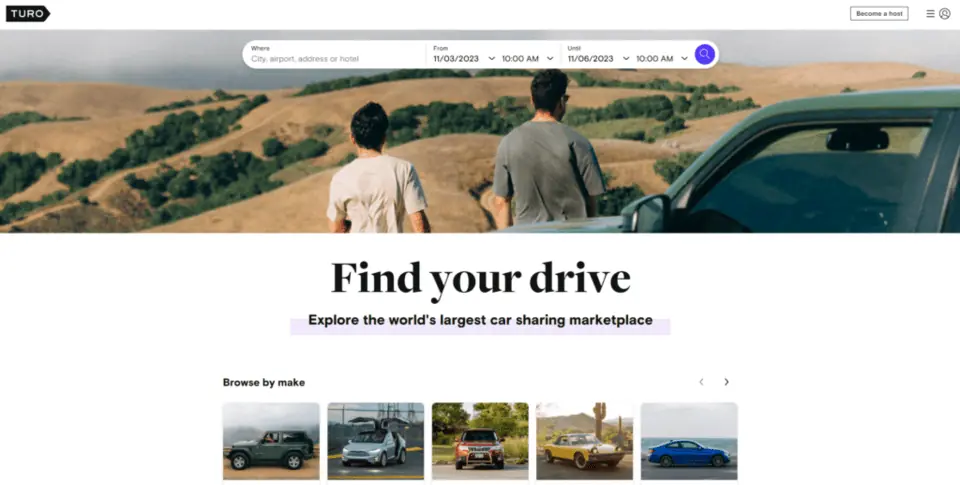
Using the Turo app, you can rent a variety of cars and trucks, whether you’re looking for something a bit more refined and premium or practical and budget-friendly. You can also choose a car based on its make and type, including electric cars, Teslas, SUVs, or Jeeps.
The company has been around since 2010 and used to be called RelayRides. It officially launched its app service in 2012 before rebranding to Turo in 2015.
Besides its U.S. headquarters in San Francisco, Turo has other bases in the United Kingdom, Australia, France, and Canada.
Overview of Getaround
Like Turo, Getaround is also headquartered in San Francisco. It’s a peer car rental service founded in 2009. It opened its app services in 2011. By 2019, the car-sharing company acquired Drivy, a European competitor, for $300 million to expand its users overseas.

How Getaround works is similar to Turo’s service model, where it connects car owners and car renters. The basics of Getaround are almost the same as Turo. One of the prime distinguishing points between the two competitors is that Turo has a larger audience.
Despite the wider availability offered by Turo, Getaround still offers a more affordable price when renting a vehicle.
Availability and Location Reach
When it comes to availability and location reach, Turo takes the cake. It’s more spread out than Getaround, thanks to its international presence in countries like Australia, France, and Canada. It’s also available in all 50 states.
Meanwhile, Getaround’s locations are more limited, expanding to about 300 US cities and 800 international cities. Some of its international locations include cities in Spain, Andorra, and Denmark.
The car-sharing app is more predominant in local areas like California, New Jersey, and Massachusetts.
Besides location reach, you’ll also want to consider the companies’ market penetration and which is more prevalent. In Turo’s case, the car-sharing platform ranked 11th in terms of brand awareness. 25% of US respondents in Statista recognized the brand.
In a similar survey, 27% of respondents recognized Getaround in the US. As for market share numbers, the company holds over 8-10% of the market’s pie.
Ease of Use and Customer Experience
When renting a car, most users want a seamless process that doesn’t involve long-winded steps. The good news is that both Turo and Getaround offer an exceptional, user-friendly experience.
As you enter their site platform, they’ll ask you for similar specifications. You’ll need to key in your pickup location and how long you plan to rent the car.
Once you pick all that, you’ll be redirected to a page with a list of choices. Turo and Getarounds’ platform interfaces are similar where you’ll see a clear image of the car, hourly rate, and user rating.
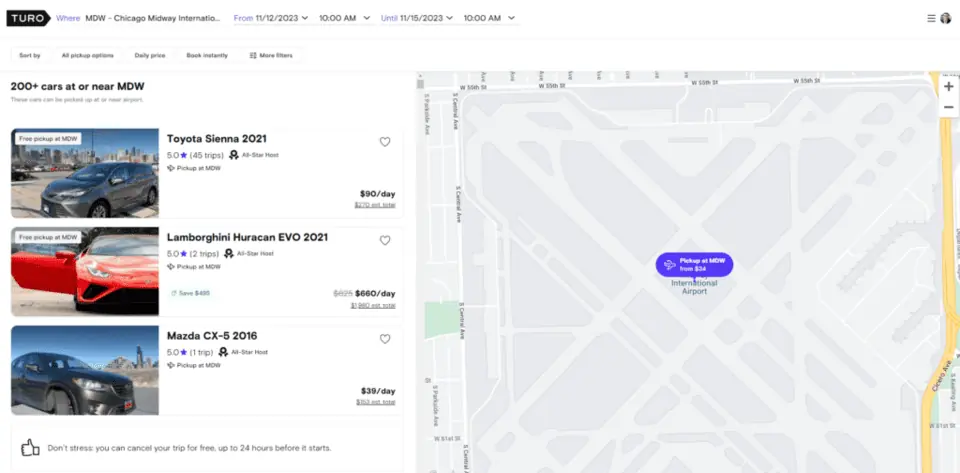
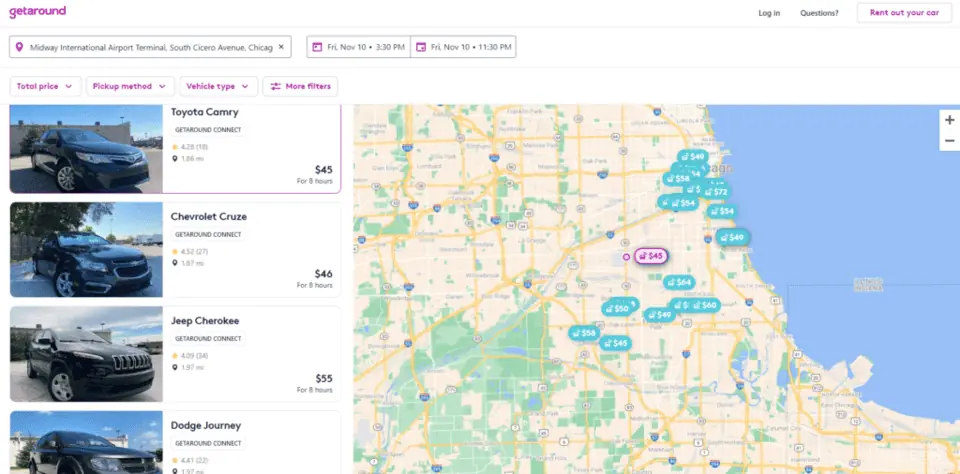
It doesn’t end there. You can further specify the type of car you’re looking for by using the filters available. For both car-sharing apps, you can filter the:
- Trip Price
- Transmission
- Pickup Method
- Make
- Vehicle Years
- Number of Seats
You’ll notice minor differences in the filter. For instance, Getaround allows you to choose the vehicle’s fuel type, while Turo lets you pick deluxe and highly-rated options.
Once you’ve made your pick, both sites will direct you toward the booking page, where you can sign in, enter your payment information, and finalize the rental process.
Besides booking, Turo and Getaround offer an interactive customer experience. Should you encounter any issues, you can enter their platform and notify them via their support pages.
Both car-sharing platforms also have an extensive page filled with resources dedicated to ease you through every step of the renting and hosting process.
Car Selection and Variety
If we’re talking about car selection and variety, the best cars are on Turo. You can choose from several premium names, including Rolls-Royce, Porsche, Mercedes-Benz, Tesla, and Lamborghini.
You can drive in luxury without having to worry about the stacking costs of maintenance and care. It’ll also be a perfect ride to cruise through on a vacation with a beach view on your side.
Luxury aside, Turo also offers a host of other car selections, including electric cars, minivans, trucks, classic cars, and SUVs.
While Getaround doesn’t have as much of a selection as Turo when it comes to premium makes, it’ll still have what you need, whether you’re looking for a seven-seater family van or a convertible ride.
After finding the car you need on the car-sharing platform, you’ll want to check if it’s available for immediate rent. This is where Turo also wins.
The app has a “Book Instantly” feature that allows users to reserve the car without waiting for the host’s approval.
Pricing Structure
Turo and Getaround vary significantly regarding their pricing structure.
Turo’s Pricing Structure, Costs, & Fees
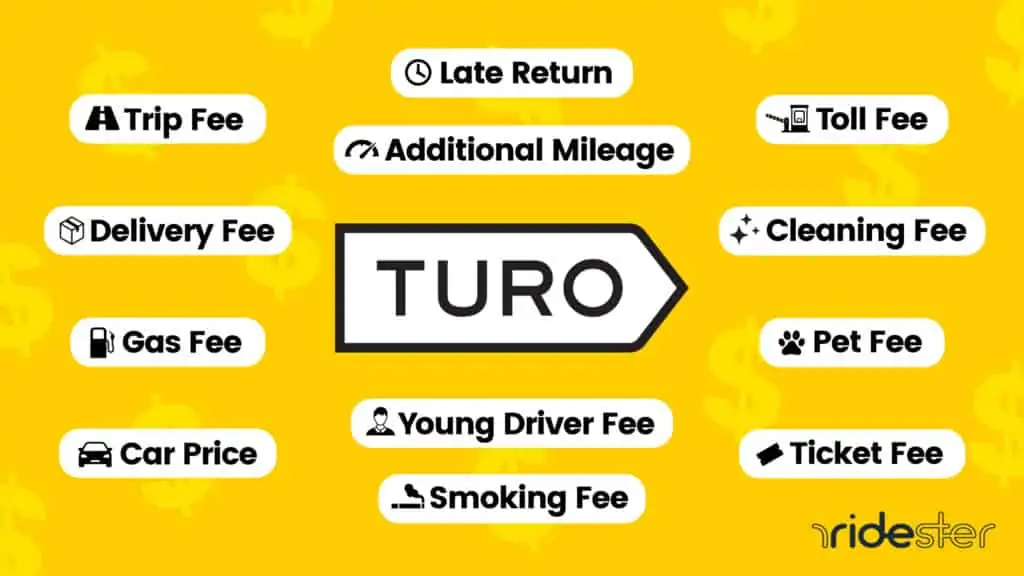
Common Turo fees include the following:
- Trip Fee: It’s a percentage of the trip that goes to the Turo platform. It can depend on the vehicle’s value and trip duration and ranges from 2.5% to 100% with a $15 minimum.
- Protection: Protection plans vary in price depending on which country you’re booking from.
- Turo’s Young Driver Fee: If you’re between 18 and 21 and want to book a high-value car, chances are you’ll incur this fee.
- Airport Fee: If your host is delivering your car to the airport, you’ll have to pay this fee, which is directly remitted to the airport.
- Extras: These include add-on features like unlimited mileage and trip enhancements like providing tents and bicycles.
- Pickup/Return Fee: The host charges this amount to deliver and pick up the vehicle.
- Security Deposit: This is charged for guests traveling between the UK and EU or those booking Super Deluxe cars.
- Cancellation Fee: If a host cancels a trip less than 24 hours before the booking, they’re subject to a $50 cancellation fee.
- Additional Mileage: If a guest exceeds the mileage limits, hosts can charge between $0.01 to $3.00 per extra mile.
Pricing the Vehicle
As a host, Turo can help you set a price for your car. You get two options, automatic or custom pricing. If you’re not sure how much you should charge for an hourly rate, Turo does it for you and considers the car’s type, location, and fluctuations in supply and demand.
If you want to list a custom price, Turo can also help by providing you with the latest pricing insights. When you check a vehicle’s calendar in the app, it’ll prompt you to “Swipe up for more insights.” There, you can see the price trends and match them.
Turo also has a profit-making feature called a last-minute boost. If a guest is booking your car for the same day, and you’ve previously set your “Advance notice” to 24 hours, you can charge them 5% extra.
Discounts
Turo offers discounts for multiple occasions. One of them includes an early bird discount for those who book a week or more in advance.
You also get a discount if you book a car for more than 3, 7, or 30 days. Hosts will get to decide whether the discount will apply to their vehicle or not.
Getaround’s Pricing Structure, Costs, & Fees
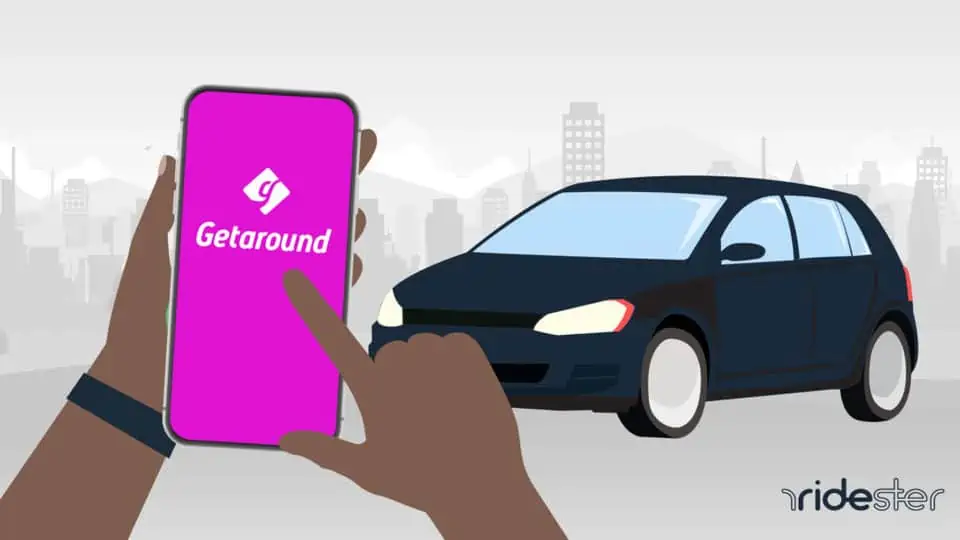
Getaround’s fee structure varies slightly from Turo’s. Here’s what to expect:
Subscription Fees
Being a host, you’ll have to pay the Connect™ Setup Fee and the monthly Connect™ subscription fee.
The prior is a one-time $99 amount to pay for the Getaround Connect™ set up in your car during onboarding. This device will allow guests to access your car without your presence. The monthly Connect™ subscription fee differs based on the following table:
| Number of Cars Listed | Payment Per Month Per Car |
| 1 | $20 |
| 2-9 | $18 |
| 10-49 | $15 |
| 50-99 | $12 |
| 100+ | $10 |
Pricing the Vehicle
When pricing your car with Getaround, you’ll have to account for additional fees during booking. For example, if you list a $40 daily rate, that won’t mean your guest will pay $40 alone. They’ll also be charged other fees from the platform.
For this reason, it’ll be more challenging to get a decent profit while offering an attractive price for guests. Getaround thought about that and developed its Smart Pricing feature. It works like Turo’s Automatic Pricing by calculating a price based on demand.
In Getaround’s case, the first hour’s price is 45% of the daily price to ensure that the host gets a reasonable profit. As the guest books for a longer rental, the price will reduce for a better value.
Hosts can increase prices during weekends and or peak seasons.
Fees to Consider
The fees added to the host’s price primarily include insurance, service, and driver service fees. Here’s what to consider.
- Service Fee: A standard 25% of the daily price a host picks. It goes to the Getaround platform directly.
- Booking Fee: They can range between 10% and 15% of the rental cost.
- License Fee: A one-time $10 amount to cover the driver record processing.
- Additional Mileage: Usually an extra $0.50 but can go up to $5 per mile for luxury brand cars.
- Cancellation Fees: If you cancel less than 24 hours before a booking, you’ll owe 50% of the booking price.
- Under 25 Fee: Meant to insure young drivers
- Age 19: 75% of trip price
- Age 20: 45% of trip price
- Age 21: 25% of trip price
- Age 22: 15% of trip price
- Age 23: 10% of trip price
- Age 24: 5% of trip price
Insurance and Protection Policies
Reviewing the insurance and protection policies of each app is essential to ensure you’ve made the safest pick as a host or guest. In this case, Turo offers a more comprehensive protection plan for both parties.
As a host, you get to choose between five plans that all cover over $750,000 in third-party liability insurance from the company Travellers. Meanwhile, guests choose from four plans that will suit their budgetary preferences.
Getaround’s insurance and protection policy is much simpler. The company covers any incidents that happen on an active trip. The guest would be responsible for a $250 to $3,000 damage fee for every incident that varies based on their protection plan.
To file a claim with Getaround, open the application and navigate to the “Report Damage” tab, then complete and submit the form. Getaround’s claim process is covered by a third-party collaborator called ServiceUp.
With Turo, you’ll have to report the damage no more than 24 hours after the accident occurred directly. Afterward, follow up with the claims department by contacting them via email. They should respond within two business days.
Renting Policies and Restrictions
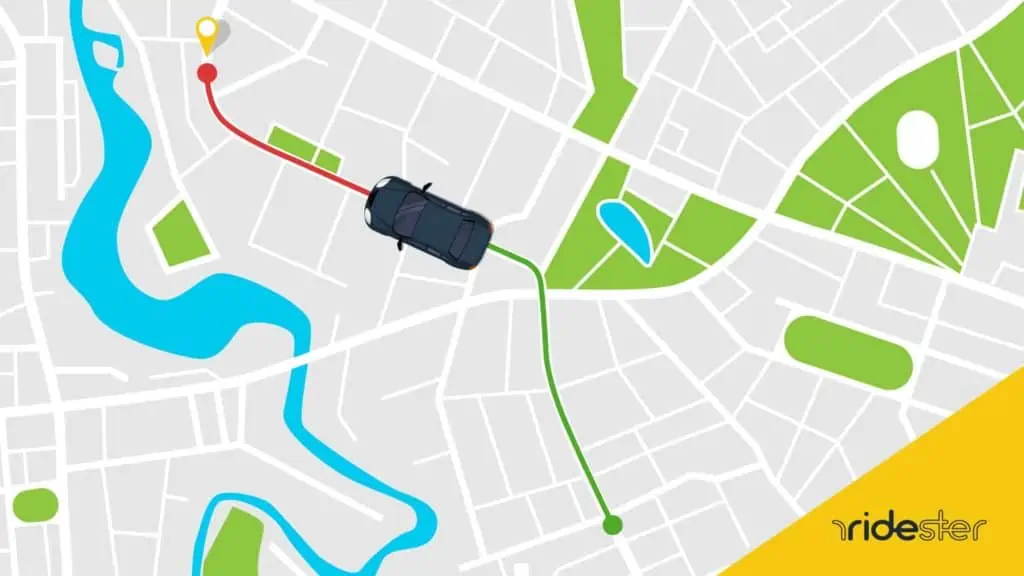
Turo and Getaround have distinct renting policies and restrictions. For instance, Getaround’s mileage limits in standard rides are 200 miles per day, while Turo allows their host to set the limit.
When it comes to rental duration, Getaround has a 30-day limit. Turo doesn’t have a rental duration limit.
As for the driver’s eligibility, with Turo, you’ll have to meet their age requirement and provide the following information:
- Home Address
- Driver’s License Number and Expiration Date
- Payment Method
- Personal Photo
Besides that, you also have to meet Turo’s Auto Insurance Score benchmark.
For Getaround, guests must be at least 19 years old and haven’t been involved in alcohol-related or major violation incidents within the previous three years. Other eligibility points are also taken into consideration, depending on your location.
User Reviews and Trustworthiness
According to third-party review website Trustpilot, Getaround ranks a lower 4.0 stars compared to Turo’s 4.6. The latter also has more reviewers reaching out than Getaround.
Turo also won a higher 4.9-star review in Google Play than Getaround’s 3.4 stars.
Most of the complaints on Getaround’s review page correlate with low-quality user interface in the mobile application. Turo’s low reviews come from users complaining about high prices and app instabilities.
Wrapping Up
So what’s better, Turo or Getaround? To conclude, Turo offers a wider car selection, extensive availability, more versatility when renting, and a safer insurance policy.
Getaround primarily gives you more affordable pricing options. Overall, both offer similar platform interfaces and services, whether you’re a car host or guest.





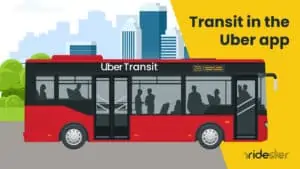


What about car maintenance requirements for the car owners? Are they required to submit information about their car service/maintenance? I recently rented from Turo and the parking break broke (how). I since learned to never use the parking brake unless I’m in San Francisco… Right or wrong, I trust traditional rental agencies to properly maintain their cars, but how do we know that individual owners are taking care of the cars they rent out?
obviously you over powered the E-Brake cable. it is not to hard to do, and has nothing to do with maintenance.its more to do with pulling to hard or pushing to hard.
owners who don’t maintain there vehicles are going to loss money and clients as well. Since both platforms offer user remarks on rentals. The profit depends entirely on amount of rentals and value of car at end of rental life. So no maintenance will cost more to rent and be valued less at end of rental life.